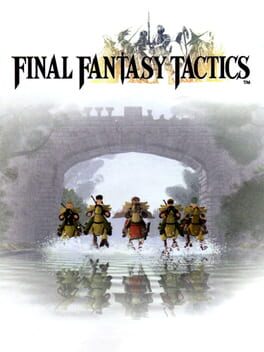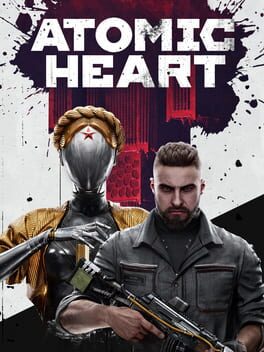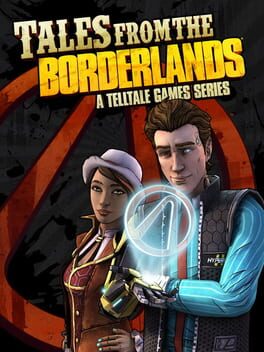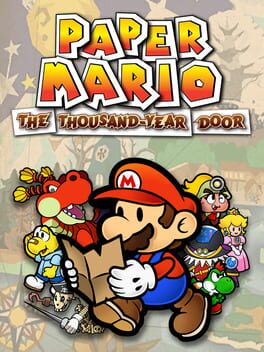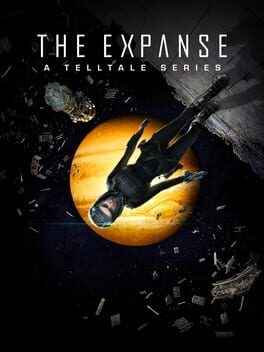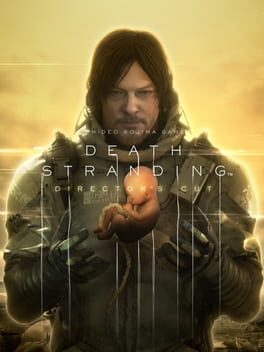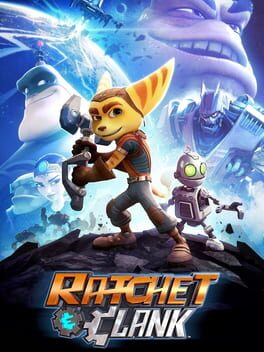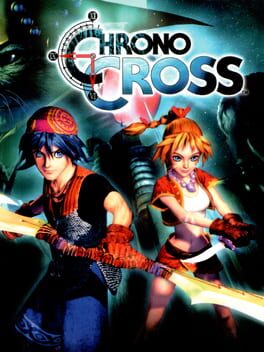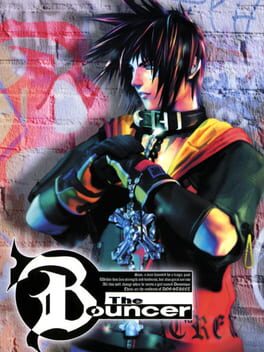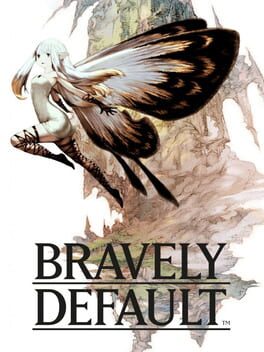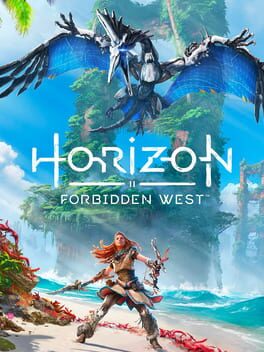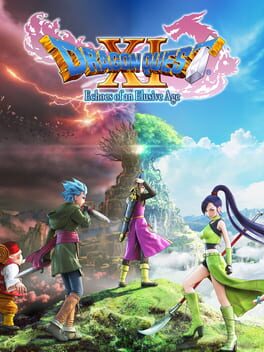Hugechromepeach
2023
Final Fantasy 16 in many aspects is a huge departure from the mainline series, mainly being its complete abandonment of its turn-based RPG roots in becoming a full fledged action/adventure title. Luckily SquareEnix's decision was well planned and bringing in Ryota Suzuki, (of Devil May Cry), to steer the combat's new direction was a great choice. The stop-and-go pacing of the story and unengaging sidequests severly hamper the overall experience of FF16, but overall its a cinematic marvel with a visual spectacle and flair unrivaled in all of gaming. There's a rich tapestry of interesting themes and concepts at its peak moments, complemented tremendously by the superb voice acting. Though inconsistent, FF16 remains a must play for PS5 owners.
2023
At times clunky and unpolished, whilst sporting a incessantly obnoxious protagonist, Atomic Heart can feel grating at times. Underneath its inherent flaws however, lies a gorgeously crafted world unique in almost every aspect, tight FPS mechanics with some of the best melee combat in the genre, and a well paced story. A little more time in the oven to bake out the kinks would have gone a long way to smoothe out the jank, but as it stands Atomic Heart is still an aesthetic marvel interlaced with satisfying, weighty gameplay.
Spiderman 2 is the epitome of ESG on overdrive, constantly searching for a chance to insert diversity or shove an ideology down the players throat,(particulary the side missions), than to create a compelling and original narrative.
The story is trite and nonsensical, sporting cheesy dialogue and predictable plot points. Miles Morales remains an entirely uninteresting character merely created for pandering purposes, and every hamfisted attempt to implement him derails what little story arch the game has with MJ, Peter, and Harry.
Combat is well done, with the utilization of gadgets and abilities seamlessly mixing with its silky smooth animations. Although its very generic for the genre, the fighting just feels right. While its an appreciated attempt at a change of pace, the gameplay outside of its core combat are half baked variations of gameplay styles from other titles, and the Mary Jane "stealth" segments are an utter joke, inadvertently making MJ and her tazor stronger than both Spidermen combined.
Swinging around in the richly detailed cityscape of New York and beating up bad guys as Spiderman can be a blast, yet everything else surrounding it is an unmitigated mess, commiting every sin of contemporary gaming possible. The photo mode goes hard though.
The story is trite and nonsensical, sporting cheesy dialogue and predictable plot points. Miles Morales remains an entirely uninteresting character merely created for pandering purposes, and every hamfisted attempt to implement him derails what little story arch the game has with MJ, Peter, and Harry.
Combat is well done, with the utilization of gadgets and abilities seamlessly mixing with its silky smooth animations. Although its very generic for the genre, the fighting just feels right. While its an appreciated attempt at a change of pace, the gameplay outside of its core combat are half baked variations of gameplay styles from other titles, and the Mary Jane "stealth" segments are an utter joke, inadvertently making MJ and her tazor stronger than both Spidermen combined.
Swinging around in the richly detailed cityscape of New York and beating up bad guys as Spiderman can be a blast, yet everything else surrounding it is an unmitigated mess, commiting every sin of contemporary gaming possible. The photo mode goes hard though.
Tales from the Borderlands is one of Telltales best and certainly funniest games. The openings of each episode and its use of liscensed music is superb. The writing is clever and the story unfolds at a timely pace, never feeling convoluted or unnecessary. The choices the player makes are not as consequential as say, the ones in the Walking Dead or other Telltale titles, but they can differentiate the way characters can percieve each other. When it comes down to it, character dynamics and the way each of your assorted party members play off each other is the name of the game here. Some of these characters are so well done they have become iconic for the Borderlands series as a whole. Muddied textures, stiff animations, and dips in framerate, (particulary within QTE sequences), are present, but they never truly hamper this quirckier than usual trek through Pandora.
Whats Immediately apparent once beginning the Expanse are the bizarrely poor character designs and animations. The face shapes of everyone very to the verge of not resembling the same species. And for a game with such an emphasis on traversal comparatively to other Telltale titles the awkward animations, (particularly how Summers walks), needed to be refined. Dialogue is horrendous, resorting to the use of the word "fuck" repeatedly to infer any resemblence of emotional resonance. Whats even worse is the delivery. Aside from Cox every voice actor gives an egregiously poor performance. Summers' bland and monotone voice serves as a barrier, making her already stale and one dimensional character impenetrable to relate with. Sadly these rather damning flaws pale in comparision to the Expanse's most cardinal sin...the removal of choice.
The slight emphasis on exploration and the freedom of movement is a refreshing change. This is the strongest influence Deck Nine brings to the title, and can be both rewarding and fun. But in no way, shape, or form should this have relegated the player's choice in shaping the narrative to the sideline like it does. The choice prompts have been reduced to merely 2 options, are extremely seldom, and the majority of said choices are the same option with different wording. A choose your path adventure without paths to choose....the few times you are allowed to make a difference have little to no consequence on shaping the story.
For developers of such high pedigree and with such a solid core in the source material, fans of the show and game studios should expect and deserve better.
The slight emphasis on exploration and the freedom of movement is a refreshing change. This is the strongest influence Deck Nine brings to the title, and can be both rewarding and fun. But in no way, shape, or form should this have relegated the player's choice in shaping the narrative to the sideline like it does. The choice prompts have been reduced to merely 2 options, are extremely seldom, and the majority of said choices are the same option with different wording. A choose your path adventure without paths to choose....the few times you are allowed to make a difference have little to no consequence on shaping the story.
For developers of such high pedigree and with such a solid core in the source material, fans of the show and game studios should expect and deserve better.
Yes, Death Stranding's photo realistic visuals are breathtaking, boasting an artstyle and character designs just as stunning. Yes, Kojima has crafted another brilliantly bizzare story. One that is far more personal and emotionally evocative than anything hes produced before. Yes it's gameplay is wholly unique, with an ever increasingly addictive loop that compels you to grab yet another delivery...and then another. Death Stranding knocks it out of the park with everything we typically look for in a great video game. But Death Stranding is much, much more than that.
At the risk of sounding pretentious all I can say is that Kojima's latest, (and greatest), vision is indescribable. A beautiful and resoundingly profound message on the importance of connection. This translates not only through its awe inspiring story with meticulously curated cuts scenes but through the gameplay as well. The "strand" form of multiplayer literally transforms the mental workings you generally have in a single player experience. Wanting to help others with their journey starts to take priority over your own progress as you slowly form connections with other players you'll never actually meet, yet feel grateful for their contribution in helping you climb over the next hill or remind you to take in the view with a well placed sign.
Its a game like no other. Its a masterpiece. Its a work of art. It quickly became my favorite game of all time.
At the risk of sounding pretentious all I can say is that Kojima's latest, (and greatest), vision is indescribable. A beautiful and resoundingly profound message on the importance of connection. This translates not only through its awe inspiring story with meticulously curated cuts scenes but through the gameplay as well. The "strand" form of multiplayer literally transforms the mental workings you generally have in a single player experience. Wanting to help others with their journey starts to take priority over your own progress as you slowly form connections with other players you'll never actually meet, yet feel grateful for their contribution in helping you climb over the next hill or remind you to take in the view with a well placed sign.
Its a game like no other. Its a masterpiece. Its a work of art. It quickly became my favorite game of all time.
2016
A reimagining of Ratchet and Clank's humble begginings based on the movie. The visuals are stunningly vibrant and the planets you visit are brimming with soul. Level design, weapons, and gadgetry carry on being a highlight for the series, with a breakneck pace that continuously entertains. The story and humor isn't on par with it's plethora of PS2 counterparts, but is charming on it's own right nonetheless.
2015 Ratchet and Clank blends contemporary modern conveniences with its classic action-platforming gameplay with precision, providing an excellent diving board for newcomers to the titular duo and longtime fans as well.
2015 Ratchet and Clank blends contemporary modern conveniences with its classic action-platforming gameplay with precision, providing an excellent diving board for newcomers to the titular duo and longtime fans as well.
1999
Chrono Cross is on paper a sequel to Chrono Trigger. With an entirely different cast of protagonists, set in a seemingly different world at first, and with a story only ambiguously connected to the original, one can understand the contempt some fans of Trigger have expressed throughout the years.
Divorcing Chrono Cross from Trigger and judging the game on its own merits is the best way to experience the title. Luckily it provides some truly unique, yet at times, overly ambitious features to the turn based format, with a story conceptually just as ambitious.
Like many Squaresoft entries at this period of time, the pre-rendered backgrounds are downright gorgeous. Nobuteru Yuuki's lush and vivid color pallette are striking in virtually every camera fixed screen. The game from a visual standpoint is uniquely recognizable and is a huge strength, standing out from many of its drab and dreary looking contemporaries, boasting just as lively a score as well. Another feature unique to Chrono Cross is its party recruitment system. While it's certainly neat to have roughly 40 playable characters to choose from within your party, (some available/un-available depending on your choices), this forces a vast amount of party members to be skin deep in their development, albeit there's a hearty chunk of backstory and progression for more prominent characters nestled within the sidequests.
The story to Chrono Cross is a convoluted, yet ultimately, existential triumph. Sadly its poorly delivered for the most part. A large amount of its overarching themes and plot is dumped on you near endgame and the dialougue for the most part is poor. I'm assuming this is specifically due to crude localization, a problem many JRPGs suffered from in this era.
Overall Chrono Cross doesn't share the same emotional impact its predecessor conjures. Having said that, dismissing its beautiful locales, wholly diverse set of characters, one of a kind battle mechanics, and grandiose storytelling would be a shame for any Turn- Based fantatic.
Divorcing Chrono Cross from Trigger and judging the game on its own merits is the best way to experience the title. Luckily it provides some truly unique, yet at times, overly ambitious features to the turn based format, with a story conceptually just as ambitious.
Like many Squaresoft entries at this period of time, the pre-rendered backgrounds are downright gorgeous. Nobuteru Yuuki's lush and vivid color pallette are striking in virtually every camera fixed screen. The game from a visual standpoint is uniquely recognizable and is a huge strength, standing out from many of its drab and dreary looking contemporaries, boasting just as lively a score as well. Another feature unique to Chrono Cross is its party recruitment system. While it's certainly neat to have roughly 40 playable characters to choose from within your party, (some available/un-available depending on your choices), this forces a vast amount of party members to be skin deep in their development, albeit there's a hearty chunk of backstory and progression for more prominent characters nestled within the sidequests.
The story to Chrono Cross is a convoluted, yet ultimately, existential triumph. Sadly its poorly delivered for the most part. A large amount of its overarching themes and plot is dumped on you near endgame and the dialougue for the most part is poor. I'm assuming this is specifically due to crude localization, a problem many JRPGs suffered from in this era.
Overall Chrono Cross doesn't share the same emotional impact its predecessor conjures. Having said that, dismissing its beautiful locales, wholly diverse set of characters, one of a kind battle mechanics, and grandiose storytelling would be a shame for any Turn- Based fantatic.
2000
An extremlely clunky yet servicable beat em up with a simplistic yet effective progression system. The Bouncer is an incredibly short and streamlined experience, which makes the lack of depth palatable. Its an oddly segmented and at times frustrating mess, but theres some charm to be found.
P.S. Sion's character design is an obvious prototype of Sora.
P.S. Sion's character design is an obvious prototype of Sora.
2013
The Yakuza series has always been known for it's intricately detailed cities to explore, an expansive story crossing the entire spectrum of human emotions, and a bounty of side activities; where a player can easily spend an entire day of gaming whacking away at baseballs or driving go-karts. Unfortunately the Yakuza series' brawler style game mechanics never evolved with the time. Making combat scenarios an archaic and borish routine.
Switching to a turn-based battle system has been a godsend for the series, making the gameplay just as great as everything else surrounding it. The change was a risky yet calculated gamble, brilliantly incorporating the series' offbeat humor and brawler roots.
A great battle system is a key component to a great JRPG, but the heart is it's story and characters. Yakuza 7 is undoubtedly top tier in these regards. The cast is stellar, particularly Ichiban, whose sense of loyalty and genuine concern for his friends is infectious. A protagonist for the ages that is not only one of the best in the genre, but for gaming in general.
Like a Dragon's revamp to the series while maintaining its highly touted core identity makes this the peak entry for the acclaimed franchise. A ludicrously funny good time.
Switching to a turn-based battle system has been a godsend for the series, making the gameplay just as great as everything else surrounding it. The change was a risky yet calculated gamble, brilliantly incorporating the series' offbeat humor and brawler roots.
A great battle system is a key component to a great JRPG, but the heart is it's story and characters. Yakuza 7 is undoubtedly top tier in these regards. The cast is stellar, particularly Ichiban, whose sense of loyalty and genuine concern for his friends is infectious. A protagonist for the ages that is not only one of the best in the genre, but for gaming in general.
Like a Dragon's revamp to the series while maintaining its highly touted core identity makes this the peak entry for the acclaimed franchise. A ludicrously funny good time.
Starting off with the first impression that Forbidden West will inevitably instill in anyone that plays it is the best place to begin when discussing Zero Dawns succesor, since sadly it is arguably its greatest strength. Horizon Forbidden West is a gorgeous game. Enemy designs are hyper detailed, and the densely realized landscape to explore is a sight to behold, utilizing the power of the PS5 that very few,(if any),have come close to, to this day. Much like in the prior title, I was constantly in photo mode, as the game relentlessly throws jaw dropping visual displays at a near constant basis. From a technical perspective the game runs just as well, with virtually no hiccups throughout my playthrough. An incredible feat for an open world game. However, Forbidden West shares far too many similarities to its open world counterparts that shouldnt be replicated; ultimately making the venture through the GAIA transmorphed Earth a borderline middling affair.
From the get go, the ESG agenda is hard to miss. The apparent vitriol Aloy has for men is downright ugly to experience. Almost every White man is either a boob with no common sense or downright evil. Anyone with a remote sense of competence is typically a women or an effeminate black man, and the pattern of gender/race correlation to ones morality continues through, from beginning to end. Its not at a level to outright ruin the experience, but certainly dampers any attempt for an engaging story. This is particulary egregious given how much help Forbidden West's story needs.
While the backstory is intriguing and well fleshed out, the deliverance is an absolute drag. Almost every bit of exposition is simply one character standing infront of the other, stating their lines like slightly animated mannequins. A few nuances in direction makes it a slight improvement over the it's predecessor containing the same issue, but doesn't remedy the problem at all. This is a very prominent motiff for the title in general; Improving on the prior game's faults without ever outright fixing the problem.
Combat is kept relatively the same as the original with a few welcome additions, yet are hardly viable given the efficacy the strike, shoot, dodge formula is. Fighting giant mech beast continues to be thrilling, but the human enemy types once again have braindead AI and the attempts to add depth to the fighting mechanics for the most part fall flat. The gameplay just doesnt have the legs to satiate such a long venture.
Like many contemporary open world games, it is just far too content rich for its own good. Horizon Forbidden West is insanely bloated, with many activities being boring filler that studios just cant seem to help but implement for the sake of padding. Not only that, its the same sort of activities you find in a myriad of other titles; most of the time those games do it better as well.
Horizon Forbidden West is indeed a good game that improves on Zero Dawn in virtually every way, but for every positive attribute theres just as many negatives pulling the other way. Aside from the visual spectacle its sadly not a very memorable adventure, joining the exceedingly crowded list of open world experiences with a lot to do, but not much truly worth doing.
From the get go, the ESG agenda is hard to miss. The apparent vitriol Aloy has for men is downright ugly to experience. Almost every White man is either a boob with no common sense or downright evil. Anyone with a remote sense of competence is typically a women or an effeminate black man, and the pattern of gender/race correlation to ones morality continues through, from beginning to end. Its not at a level to outright ruin the experience, but certainly dampers any attempt for an engaging story. This is particulary egregious given how much help Forbidden West's story needs.
While the backstory is intriguing and well fleshed out, the deliverance is an absolute drag. Almost every bit of exposition is simply one character standing infront of the other, stating their lines like slightly animated mannequins. A few nuances in direction makes it a slight improvement over the it's predecessor containing the same issue, but doesn't remedy the problem at all. This is a very prominent motiff for the title in general; Improving on the prior game's faults without ever outright fixing the problem.
Combat is kept relatively the same as the original with a few welcome additions, yet are hardly viable given the efficacy the strike, shoot, dodge formula is. Fighting giant mech beast continues to be thrilling, but the human enemy types once again have braindead AI and the attempts to add depth to the fighting mechanics for the most part fall flat. The gameplay just doesnt have the legs to satiate such a long venture.
Like many contemporary open world games, it is just far too content rich for its own good. Horizon Forbidden West is insanely bloated, with many activities being boring filler that studios just cant seem to help but implement for the sake of padding. Not only that, its the same sort of activities you find in a myriad of other titles; most of the time those games do it better as well.
Horizon Forbidden West is indeed a good game that improves on Zero Dawn in virtually every way, but for every positive attribute theres just as many negatives pulling the other way. Aside from the visual spectacle its sadly not a very memorable adventure, joining the exceedingly crowded list of open world experiences with a lot to do, but not much truly worth doing.
It's hard not to be immediately impressed with Dragon Quest 11 merely for its presentation alone. Akira Toriyama's character designs have never been so beautifully realized, placed within a backdrop of vibrant colors and a timeless artstlye. DQ 11 is truly one of the most beautiful games I have ever seen. Reminiscent of Ni-No Kuni and Blue Dragon, far exceeding its graphical limits through sheer artistry.
Dragon Quest 11 is a traditional JRPG through and through, with a bevy of contemporary tweaks and quality of life improvements to temper the tedium of an older gametype. The auto run, sprint, spells for fast travel, etc. go a long way to alleviate annoyances older titles are plagued with, allowing the player to immerse themselves in the adventure and not be bogged down with backtracking or menu managment. This coupled with the charm and wonderful voice acting makes the story a joy to unravel. There's nothing revolutionary about it but it's extremely fitting, exhuding a sense of coziness contrasted with its epic scale of adventure the franchise is known for.
Combat is the tried and true turn based formula of age-old series, nestled in a depth between novice and hardcore difficulty; making it accessible for newcomers yet engaging enough for longtime fans. Towns and cities are standard fare for the genre, but are filled to the gills with NPCs to talk to and in the later half of the game activities in the major areas to occupy your time between dungeons.
While the Illusive Age takes several strides in tackling the grievances often plaguing JRPGs, not every contention has been addressed. Many of the plot lines are predictable and the characters, although likeable, are shallow with the villains hardly being even servicable. The from town to town loop so typical of these ventures can start to get stale, despite the vibrancy and life the areas of respite have to offer.
Dragon Quest 11 is a reminder that traditional turn based combat is traditional for a reason, and is a modern treat to old school fans. With it being such a streamlined, beautiful, and polished experience theres no suprise it'll gain a new fanbase as well.
Dragon Quest 11 is a traditional JRPG through and through, with a bevy of contemporary tweaks and quality of life improvements to temper the tedium of an older gametype. The auto run, sprint, spells for fast travel, etc. go a long way to alleviate annoyances older titles are plagued with, allowing the player to immerse themselves in the adventure and not be bogged down with backtracking or menu managment. This coupled with the charm and wonderful voice acting makes the story a joy to unravel. There's nothing revolutionary about it but it's extremely fitting, exhuding a sense of coziness contrasted with its epic scale of adventure the franchise is known for.
Combat is the tried and true turn based formula of age-old series, nestled in a depth between novice and hardcore difficulty; making it accessible for newcomers yet engaging enough for longtime fans. Towns and cities are standard fare for the genre, but are filled to the gills with NPCs to talk to and in the later half of the game activities in the major areas to occupy your time between dungeons.
While the Illusive Age takes several strides in tackling the grievances often plaguing JRPGs, not every contention has been addressed. Many of the plot lines are predictable and the characters, although likeable, are shallow with the villains hardly being even servicable. The from town to town loop so typical of these ventures can start to get stale, despite the vibrancy and life the areas of respite have to offer.
Dragon Quest 11 is a reminder that traditional turn based combat is traditional for a reason, and is a modern treat to old school fans. With it being such a streamlined, beautiful, and polished experience theres no suprise it'll gain a new fanbase as well.

